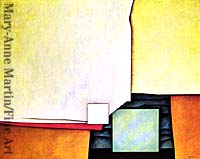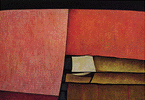I had first met Mexican artist Gunther Gerzso literally "under the volcano," on
Popocatépetl where director John Huston was filming his version of Malcolm
Lowry's novel. Gerzso, as art director, created the sets. Albert Finney had the
lead along with Jacqueline Bisset. Emilio Fernández, "El lndio," acted the part
of a brothel owner and palenque proprietor. Gabriel Figueroa was the
cinematographer. It was 1983, and Gerzso had returned to film.
Now, at his
studio, our photographer asks if Gerzso minds if he smokes. "No, but who
knows if the paintings do?" Gunther says in a mock-serious tone. With those
words, we are welcomed to his San Angel Inn house. Forty-six years earlier
he had remodeled it and moved in with his wife Gene and their two sons,
Andrew and Michael.

17. Mythologie, 1964 |
The garden is Gene's domain. The house has the order and
the exactness of Gerzso's paintings. Tall shelves of books cover the walls
and make it cozy. There are no rooms or corridors without books. He is an
avid reader, devouring three or four books a week. Between the shelves are
preColumbian sculptures. "A miserable sample of the pieces I formerly had,"
states Gerzso.
Gerzso is a large man of impeccable demeanor; his long face
is without wrinkles, and has the dissecting glance of a surgeon, maybe as
cool as the impression of his paintings can be. His posture is upright,
austere, parsimonious, and when he sits down he rests his enormous hands on
his knees. His thin lips release a sigh. His demeanor when speaking is
determined, intelligent, and provocative. He always quotes from
this or that book, a habit of his disciplined, formal, European education. As
we wait for the sunlight to photograph a detail next to Gene's piano, Gerzso
remarks, "It's like in the movies; everyone waits for the sunlight."
Gerzso
spent more then twenty years in film, from 1940 to 1964. He was living in a
house which had belonged to Julio Castellanos, when one day Francisco
Cabrera, the movie producer, knocked on his door. He asked Gunther to do his
next film, Santa, with director Norman Foster. This initiated a career of
more than 180 films during the famous golden years of Mexican
cinematography. During that long period he would go to Churubusco Studios to
earn his daily bread. In the afternoons he painted, but without any pretension
of making art; it was a form of escape, a violon d'Ingres. For Gunther,
painting is the antithesis of filmmaking. One is still, motionless, the other
full of action and movement. Painting has a simple technology, film is
complicated. Painting is an individual achievement, film a collective one.
The
crisis in Europe in 1930, and the economic situation there, interrupted his
education in Switzerland. Gunther was living in Lugano with his uncle, Dr.
Hans Wendland, an art dealer who instilled in Gunther a love of art and a
refined eye. Upon returning to Mexico in 1931, Gunther's first work was in a
production of one of Molière's plays. His attitude toward Mexico then was an
ambivalent one; he had no access to Mexico's cultural elite, and there were
few theaters in existence, so he found his way to the theater world of
Cleveland, Ohio, where he worked as a set designer. The American stage
technique impressed him, and he learned much about Broadway's theater arts
of the thirties. He met Leslie Howard. During the summers he returned to his
country and started collecting paintings by Julio Castellanos, Orozco, and
Siqueiros.











